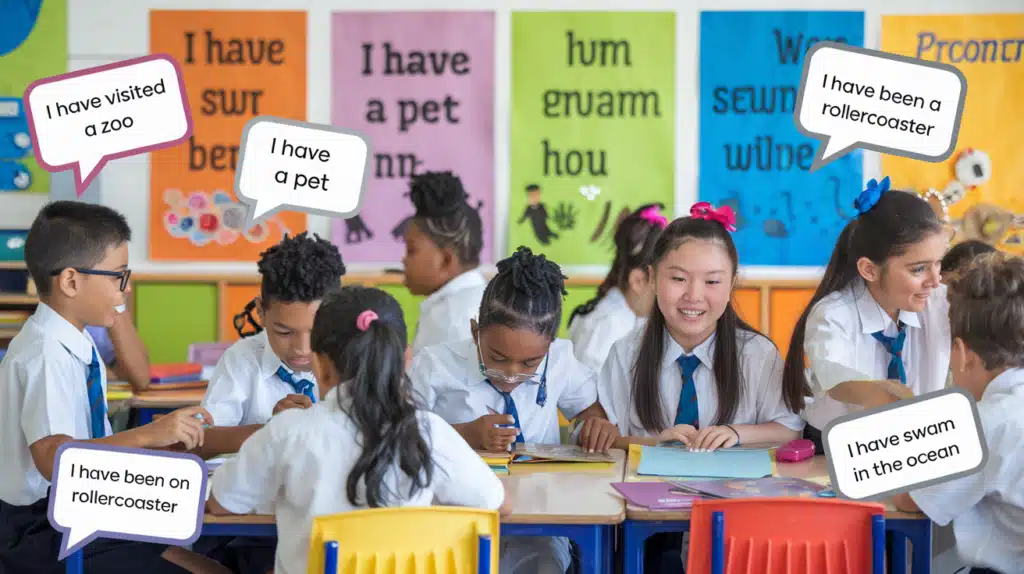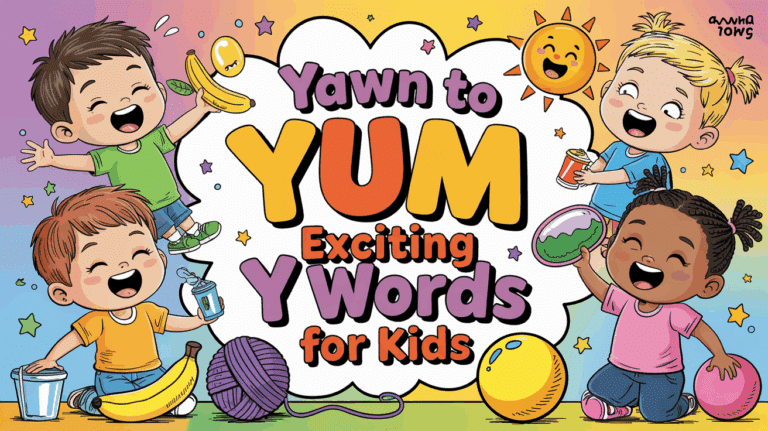Do your students fall asleep during grammar lessons?
Teaching present perfect can feel like pulling teeth. Students often zone out or get lost in the rules. Many teachers see blank faces and confused looks when explaining this tricky tense.
But here’s something different: A fun classroom activity that gets students talking, moving, and using present perfect without even thinking about grammar rules.
With this “Find Someone Who” task, your students will practice the tense naturally through real conversations.
Plus, you’ll get a free worksheet that makes prep time quick and simple.
Let me show you how this activity turns grammar practice into an enjoyable experience for both you and your students.
What Is the Present Perfect Tense?
The present perfect tense connects past actions to the present moment. We form it with “have” or “has” plus the past participle of a verb. For example: “I have lived here for five years” or “She has studied English since 2020.”
Why Is the Present Perfect Important in English?
Students need the present perfect tense for daily communication. It helps them talk about their life experiences and recent events. Without this tense, they can’t fully express how past events affect their current situation.
Many beginners use only simple past or present, which limits their ability to communicate well.
Common Uses of the Present Perfect
The present perfect works in several key situations:
- Life experiences: “I have visited Paris three times.”
- Recent actions with present results: “He has broken his arm.” (His arm is still in a cast)
- Ongoing situations: “They have worked at this company since March.”
- Unfinished time period:s “We have seen two movies this week.” (The week isn’t over)
- Actions that just happened:d “The bus has just left.”
Each use serves a specific purpose in daily conversations. Students who master these patterns can express themselves more clearly in English.
Engaging Activities to Teach the Present Perfect
How to Play “Find Someone Who”
Students need simple steps to play this activity:
- Give each student a worksheet. Each person gets a list of statements starting with “Find someone who…”
- Start moving and asking students to walk around the room and ask their classmates questions using present perfect. “Have you ever traveled abroad?”
- Write down names. When someone answers “yes,” students write that person’s name on their sheet.
- Keep the flow: Each student must talk to different classmates – no repeating names.
- Set clear time limits: Give students 10-15 minutes to complete their sheets.
Benefits of Using “Find Someone Who” for Grammar Practice
This activity offers several clear gains:
- Natural speaking practice: Students use the grammar structure without thinking about rules.
- Active learning:g Everyone moves, talks, and stays involved.
- Social interaction: Students chat with different classmates, not just their usual partners.
- Real communication: Questions lead to genuine conversations about experiences.
- Low-pressure: Students focus on talking, not on perfect grammar.
Find Someone Who…? Worksheet
(Student Worksheet)
| Question | Name of Student | Extra Information |
|---|---|---|
| 1. Has visited another country | _____________ | _________________ |
| 2. Has made their own breakfast today | _____________ | _________________ |
| 3. Has read three books this year | _____________ | _________________ |
| 4. Has played a musical instrument | _____________ | _________________ |
| 5. Has tried food from five different countries | _____________ | _________________ |
| 6. Has done their homework this morning | _____________ | _________________ |
| 7. Has taken a photo this week | _____________ | _________________ |
| 8. Has written a letter to someone | _____________ | _________________ |
| 9. Has eaten at a restaurant this week | _____________ | _________________ |
| 10. Has learned another language | _____________ | _________________ |
| 11. Has helped someone today | _____________ | _________________ |
| 12. Has won a competition | _____________ | _________________ |
| 13. Has cooked a meal | _____________ | _________________ |
| 14. Has sent an email today | _____________ | _________________ |
| 15. Has gone swimming this month | _____________ | _________________ |
| 16. Has lost something important | _____________ | _________________ |
| 17. Has met someone famous | _____________ | _________________ |
| 18. Has saved money for something special | _____________ | _________________ |
| 19. Has fixed something broken | _____________ | _________________ |
| 20. Has watched a movie this week | _____________ | _________________ |
| 21. Has missed a bus or train | _____________ | _________________ |
| 22. Has found money on the street | _____________ | _________________ |
| 23. Has forgotten their keys somewhere | _____________ | _________________ |
| 24. Has stayed up all night | _____________ | _________________ |
| 25. Has taught someone something new | _____________ | _________________ |
| 26. Has made a friend online | _____________ | _________________ |
| 27. Has grown a plant | _____________ | _________________ |
| 28. Has bought new shoes this year | _____________ | _________________ |
| 29. Has kept a secret | _____________ | _________________ |
| 30. Has learned something new this week | _____________ | _________________ |
Instructions:
- Walk around the classroom
- Ask your classmates questions using present perfect
- Write their name if they answer “yes”
- Try to get different names for each question
- Write extra information about their answer
Time limit: 15 minutes
Remember to form questions like this: “Have you ever visited another country?” “Where did you go?”
Fill-in-the-Blanks Worksheet
Instructions: Fill in the blanks using the present perfect form of the verbs in parentheses.
- Sarah __________ (visit) five countries this year.
- They __________ (live) in this house since 2010.
- My sister __________ (write) three short stories this month.
- The cat __________ (sleep) on the couch all day.
- We __________ (eat) at this restaurant twice before.
- John __________ (work) as a teacher for ten years.
- The children __________ (build) a snowman in the yard.
- She __________ (read) four books this summer.
- The doctor __________ (help) twenty patients today.
- My parents __________ (grow) vegetables in their garden.
- The team __________ (win) six matches this season.
- Our dog __________ (catch) three balls today.
- The baker __________ (make) fifty loaves since morning.
- My brother __________ (paint) two pictures this week.
- The students __________ (learn) five new songs.
- Our family __________ (save) money for a vacation.
- The chef __________ (create) a new recipe.
- Mary __________ (send) ten job applications.
- The museum __________ (display) this painting since March.
- Tom __________ (fix) three bikes this month.
- The company __________ (sell) thousand products this year.
- My aunt __________ (bake) cookies three times this week.
- The library __________ (add) new books to its collection.
- The farmer __________ (plant) trees in the field.
- Our class __________ (complete) four projects.
- The musician __________ (perform) at six concerts.
- My cousin __________ (travel) to three continents.
- The photographer __________ (take) hundreds of pictures.
- Our team __________ (practice) for three hours.
- The researcher __________ (study) this topic since 2019.
Answers Key:
- has visited
- have lived
- has written
- has slept
- have eaten
- has worked
- have built
- has read
- has helped
- have grown
- has won
- has caught
- has made
- has painted
- have learned
- has saved
- has created
- has sent
- has displayed
- has fixed
- has sold
- has baked
- has added
- has planted
- has completed
- has performed
- has traveled
- has taken
- has practiced
- has studied
Sentence Transformation Worksheet
Instructions: Transform these sentences into Present Perfect tense. Follow the example pattern.
Example: Given: She reads books every day.
Answer: She has read three books this week.
- I wrote letters yesterday. → I __________ letters since morning.
- They played tennis last weekend. → They __________ tennis twice this month.
- She studies French at school. → She __________ French for two years.
- The dog sleeps in its basket. → The dog __________ in its basket all day.
- He works at the hospital. → He __________ at the hospital since 2020.
- Mary teaches children. → Mary __________ children for ten years.
- Tom walks to school daily. → Tom __________ to school every day this term.
- The chef cooks Italian food. → The chef __________ Italian food since breakfast.
- Birds build nests in spring. → Birds __________ three nests in our garden.
- The sun shines brightly today. → The sun __________ brightly all week.
- They clean the house weekly. → They __________ the house twice this week.
- I drink water regularly. → I __________ three glasses of water today.
- She paints pictures often. → She __________ five pictures this month.
- He fixes cars at work. → He __________ ten cars since Monday.
- We plant trees in the garden. → We __________ twenty trees this spring.
- The band performs every weekend. → The band __________ at ten concerts this year.
- Students complete homework daily. → Students __________ all assignments this term.
- The store sells fresh bread. → The store __________ fifty loaves today.
- The team practices regularly. → The team __________ for three hours.
- She writes stories in her free time. → She __________ three stories this year.
- The library lends books daily. → The library __________ thousand books this month.
- He speaks at conferences. → He __________ at five conferences this year.
- Rain falls in autumn. → Rain __________ every day this week.
- The farmer grows vegetables. → The farmer __________ tomatoes since March.
- The artist draws portraits. → The artist __________ ten portraits this month.
- Children play in the park. → Children __________ in the park since morning.
- The musician composes songs. → The musician __________ three songs this week.
- People visit museums on weekends. → Many people __________ the new museum.
- The postman delivers mail daily. → The postman __________ all packages today.
- The researcher conducts experiments. → The researcher __________ five experiments this month.
Answer Key:
- have written
- have played
- has studied
- has slept
- has worked
- has taught
- has walked
- has cooked
- have built
- has shone
- have cleaned
- have drunk
- has painted
- has fixed
- have planted
- has performed
- have completed
- has sold
- has practiced
- has written
- has lent
- has spoken
- has fallen
- has grown
- has drawn
- have played
- has composed
- have visited
- has delivered
- has conducted
True or False Statements Worksheet
Instructions: Read each statement carefully. Mark “T” for True or “F” for False.
- ___ We use “has” with “I” in present perfect. (F)
- ___ “Have gone” means someone is still there. (F)
- ___ We can use “since” with specific past dates. (T)
- ___ “Have been” describes finished actions. (F)
- ___ Present perfect works with “yesterday.” (F)
- ___ “For” tells us when an action started. (F)
- ___ We can use present perfect with “last week.” (F)
- ___ “Has” goes with “they.” (F)
- ___ Present perfect shows a link to now. (T)
- ___ We use “have” with “she.” (F)
- ___ “Just” shows an action finished recently. (T)
- ___ Present perfect needs a specific time. (F)
- ___ We can say “I have eaten rice two hours ago.” (F)
- ___ “Already” means something happened before now. (T)
- ___ Present perfect works with “two days later.” (F)
- ___ We use “have” with plural nouns. (T)
- ___ “Yet” only works in questions. (F)
- ___ Present perfect shows life experiences. (T)
- ___ We can use “since” with “two hours.” (F)
- ___ “Have written” is an irregular verb form. (F)
- ___ Present perfect describes future plans. (F)
- ___ We use “has” with singular nouns. (T)
- ___ Present perfect works with specific times today. (T)
- ___ “Never” means not once in life until now. (T)
- ___ We can say “I have done it tomorrow.” (F)
- ___ Present perfect shows repeated actions until now. (T)
- ___ We use “ever” only in negative sentences. (F)
- ___ Present perfect needs a past participle. (T)
- ___ “Been” and “gone” mean the same thing. (F)
- ___ We can use present perfect with “next week.” (F)
Answer Key:
- F – We use “have” with “I”
- F – “Have gone” means they are still there
- T – Example: “since 1999”
- F – It describes continuing situations
- F – Cannot use with specific past time
- F – “For” tells us duration
- F – Cannot use with finished time
- F – Use “have” with “they”
- T – Shows past-present connection
- F – Use “has” with “she”
- T – Shows recent completion
- F – Often used without specific time
- F – Cannot mix with past time markers
- T – Indicates prior completion
- F – Cannot use with future time
- T – Example: “They have…”
- F – Works in all forms
- T – One main use
- F – Use “for” with durations
- F – Regular past participle
- F – Past-present only
- T – Third person singular
- T – Example: “today,” “this morning”
- T – Life experience until now
- F – Cannot use with future
- T – Shows repetition until present
- F – Used in questions too
- T – Essential structure
- F – Different meanings
- F – Cannot use with future time
Tips for Teaching the Present Perfect
Teaching grammar needs a light touch. Small steps and simple examples help students learn better than long rules. Here’s what works well in class.
Combining Grammar with Fun and Interaction
Start with these simple methods:
- Use real stories
- Share your own experiences using present perfect
- Ask students about their lives and activities
- Connect grammar to personal moments
- Make it physical
- Students stand up when they hear present perfect
- Clap for correct usage during speaking
- Move to different corners based on answers
- Use quick games
- Memory matches with base verbs and past participles
- Twenty questions with life experiences
- Bingo with common present perfect phrases
Adapting Activities for Different Proficiency Levels
Beginners need:
- Simple yes/no questions
- Basic life experience topics
- Clear examples with common verbs
- Short speaking tasks
- Visual aids and gestures
Intermediate students can handle:
- Mixed tense conversations
- Longer speaking tasks
- Writing activities
- Group discussions
- Time expression practice
Advanced students benefit from:
- Complex situations
- Story creation
- News discussions
- Debate topics
- Detailed writing tasks
Conclusion
The present perfect tense bridges our past experiences with our current moment.
Through activities like “Find Someone Who,” students learn this essential grammar point while having fun in class. This approach helps them grasp when and how to use the tense naturally.
Teachers play a key role in making grammar practice feel less like a task and more like a conversation.
By using fill-in-the-blanks, transformations, and true-or-false exercises, students build confidence step by step.
The activities shown here work because they put real communication first.
Remember, teaching present perfect isn’t about perfect grammar – it’s about giving students tools to share their experiences and tell their stories in meaningful ways.
















